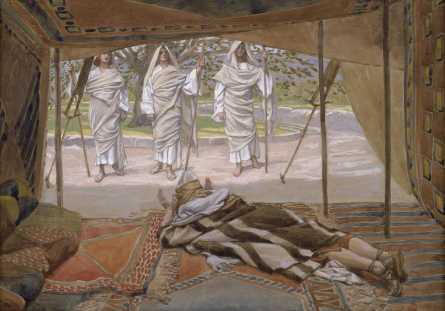The views expressed in our content reflect individual perspectives and do not represent the authoritative views of the Baha'i Faith.
After the covenant with Isaac has been fully described and sealed with circumcision—but before the actual birth of Isaac—the Bible recounts that Abraham received three unexpected visitors who arrive during the heat of the day.
Or, looking more carefully at the story, the Lord, accompanied by two men, comes to visit Abraham:
And the Lord appeared unto him in the plains of Mamre: and he sat in the tent door in the heat of the day; And he lift up his eyes and looked, and, lo, three men stood by him: and when he saw them, he ran to meet them from the tent door, and bowed himself toward the ground, saying, “if I have found favor in your eyes, my lord, do not pass your servant by.” – Genesis 18:1-2 (final sentence from New International Version).

Abraham and the Three Angels by James Tissot
Sarah and Abraham welcome the visitors and prepare a feast for them. After the feast, one of the visitors begins chatting with Sarah. He informs her that he will visit again in a year, at which time she will have a son. The information about the impending conception of Isaac isn’t new information, because the covenant between God and Isaac has already been made known to Sarah and Abraham. Why, then, is the birth of Isaac mentioned, and what is the purpose of these men?
As straightforward visitors in the Biblical story, they don’t make much sense. In many ways, they don’t even seem to be fully human. Interpretations abound, from the theory that these men have been sent to test Abraham’s goodness (he passes the test by preparing food for them) to the notion that these angelic visitors symbolize the trinity.
Another prophetic interpretation emerges from the viewpoint expressed by St. Augustine, who notes that although Abraham saw three men, he addressed them as though they were one, bowing before them and saying “Lord (singular), do not pass your servant by.”
According to Augustine, there was something about the three men that one “could not doubt that God was in them as he was wont to be in the prophets.” If God was in all three men, then it is possible to infer that they are not men but messengers of God, and that their visit is a portent of things to come. In that case, we can conclude that the angelic visitors represent three messengers who will be descendants of Isaac—Moses, Jesus, and Baha’u’llah:
…the descendants of Abraham received the special blessing that all of the Prophets of the House of Israel were raised up from among their ranks. This is a blessing that God bestowed upon that lineage. Moses, through both His father and His mother; Christ, through His mother; Muhammad: the Bab; and all the Prophets and Holy Ones of Israel belong to that lineage. Baha’u’llah too is a lineal descendent of Abraham, for Abraham had other sons besides Ishmael and Isaac who in those days emigrated to the regions of Persia and Afghanistan, and the Blessed Beauty [Baha’u’llah] is one of their descendants. – Abdu’l-Baha, Some Answered Questions, newly revised edition, pp. 246-247.
After the three mysterious visitors have finished talking with Sarah and Abraham about Sarah’s impending pregnancy, they set off to visit Lot, who is still doing his best to preach the new gospel to the wicked inhabitants of Sodom. Abraham decides to accompany them part of the way.
As the men walk, they begin to discuss the fate of Sodom, and the Lord says to Abraham:
The outcry against Sodom and Gomorrah is so great and their sin so grievous that I will go down and see if what they have done is as bad as the outcry that has reached me.
He indicates that if the condition of the cities is as bad as it seems, destruction will ensue. Abraham is so disconcerted by this idea that he stops walking. The Lord stays with him, but the other two men—who from now on will be described as angels in the Torah—keep walking.
To find out whether it is truly necessary to destroy Sodom and Gomorrah, Abraham begins posing questions. “Will you destroy both innocent and guilty alike?” He asks. “Suppose you find fifty innocent people there within the city—will you still destroy it, and not spare it for their sakes? Surely you wouldn’t do such a thing, destroying the innocent and the guilty exactly the same! Surely you wouldn’t do that! Should not the Judge of all the earth do what is right?”
The lord responds to Abraham by saying, “If I find fifty innocent people in Sodom, I will spare the entire city for their sake.”
Abraham chides himself for being arrogant enough to argue with the Lord—but then immediately escalates the argument:
Now that I have been so bold as to speak to the lord, though I am nothing but dust and ashes. What if the number of the righteous is five less than fifty? Will you destroy the whole city because of five people?
“If I find forty-five there,” the Lord replies, “I will not destroy it.”
Abraham is not content with forty-five. He asks what will happen if there are thirty innocents . . . and then twenty . . . and, finally, “What if only ten can be found there?”
“For the sake of ten I will not destroy it,” the Lord responds. With this, the conversation ends, and Abraham returns to his home. – Genesis 18:23-25.
Next: The Power of Innocence
















Comments
Sign in or create an account
Continue with Googleor